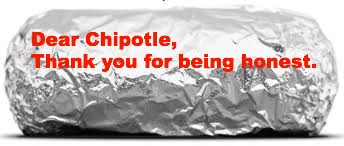
AN OPEN LETTER TO CHIPOTLE
Dear Chipotle,
We've come to know you as a leader in sustainable fast food. Your business model includes unconventional practices in the fast food industry, including sourcing ingredients from local farmers, avoiding antibiotics in your meat, and cooking food fresh, on-site every day. We hope to see more companies embracing these strategies in the future.
When you released your ingredients statement yesterday, including a listing of the GMOs found in your products, my first reaction was anger. How can a sustainable fast food company use GMOs? Isn't it against everything they stand for? Chipotle is the only fast food chain I'm willing to eat at. What will I do on nights when I don't want to cook?
When I realized that the ingredients I often consume, including brown rice, crispy chips, and tortillas, contained GMOs, I contemplated what my life might look like without Chipotle. I'll boycott Chipotle, I thought! I'll make burritos at home instead, using ingredients I can source back to the farm they came from! I'll make my own tortillas from scratch! I'll start a petition! This went on for several minutes, but after reading through your statement and really considering it, I came to a different conclusion.
Transparency across all sectors is something consumers are demanding and companies are wrestling with. It's easier to hide behind websites and office buildings, and not come clean. But you chose the path of resistance. You risked losing customers. You chose to do the right thing.
Not only have you clearly stated which ingredients contain GMOs, you also outlined the measures you're taking to eliminate GMOs from your business. Switching from soybean to sunflower oil, working to improve the shelf life of tortillas naturally, and reducing artificial preservatives are important steps.
But even more importantly, you gave me a choice. As a consumer, your transparency has empowered me to make informed decisions about which toppings I'll choose for my salad bowl, or whether I'll eat at your restaurants at all.
Thank you for your honesty, for acknowledging the areas where you can do better, and for actively taking steps to improve your business practices, the fast food industry, and our food system.
Sincerely,
A loyal customer
